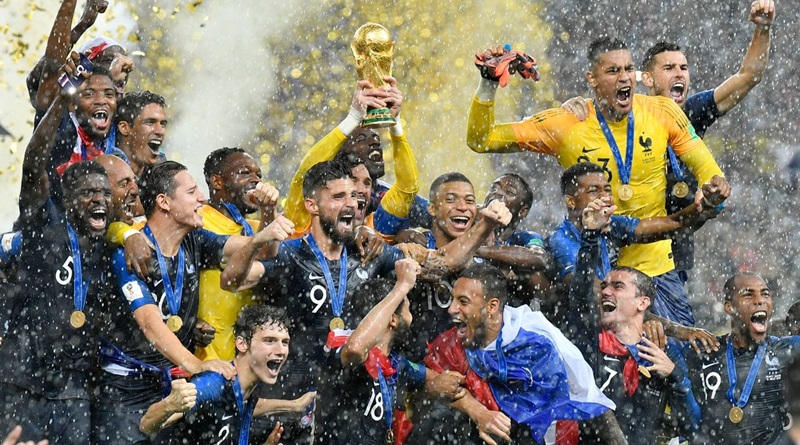2018 FIFA World Cup: 5 things we learned from tournament

After a month of great football, the 2018 FIFA World Cup has finally come to an end. It’s been a great tournament from the opening clash between Russia and Saudi Arabia to the final tussle featuring France and Croatia. Four weeks have flown by quickly, and now football fans will have to patiently wait until club season starts next month.
France is now the champion of the world, Germany fall victim to a long-standing curse, English banish some bad habits, and Croatia fully establishes themselves as deserving of the “dark horses” tag.
Here are five notable observations from the 64 games played at this summer’s World Cup.
1. France shake off ghosts of EURO 2016 at the right time
Although blessed with a plethora of talent, France was not viewed by everyone as an out-and-out option to win the World Cup. That focus was more on reigning champs Germany, Lionel Messi’s Argentina, Neymar’s Brazil, Belgium, and possibly even Cristiano Ronaldo’s Portugal as an outside shot. Les Bleus were a side that people took seriously, but some still had their doubts – which is quite absurd, to say the least. Yes, France did end up losing the EURO 2016 final to a Portugal side no one expected to get that far, but one could say that Didier Deschamps’s team used that as big motivating factor to redeem themselves at this summer’s World Cup.
Much of the core side remained the same, except for the addition of Kylian Mbappe – who wasn’t even born the last time France won the cup in 1998. France received plenty of criticism for “failing to ignite” during the group stages, but clearly, the team who scores the most goals isn’t always the one to lift the trophy. Just ask England, who cruised through qualifiers in its first two games, but only ultimately finished in fourth, whilst Belgium also plundered nine goals in its group stage campaign but ended up in third spot.
France showed up when it really counted – and that was during the knockout rounds. A 4-3 blitz of Argentina was followed by two solid 2-0 and 1-0 wins over Uruguay and Belgium. Stars like Paul Pogba, Antoine Griezmann, and N’Golo Kante – all of who were on France’s squad at EURO 2016 – all were simply outstanding, with Griezmann and Pogba both scoring in the 4-2 rout of Croatia. Skipper Hugo Lloris was a titan between the posts, as he pulled off save after save to pick up clean sheets against Uruguay and Belgium. And of course, Mbappe, who deservedly received the Best Young Player prize, now joins Pele in a very small group as the only teenager to net in a knock-out round and in a World Cup final.
2. Smaller sides showing no intimidation
This was the tournament where the so-called smaller teams made their mark. Now, smaller doesn’t always mean less prestigious players – just look at the case of Croatia. However, in every tournament, there are the big dogs, and then there’s everyone else. The big powers, such as Spain, Argentina, and shockingly, Germany, all failed to show up. Other teams, like Russia, who was the lowest-ranked at this summer’s World Cup, managed to shock everyone and beat Spain in the biggest upset of this competition. Meanwhile, minnows and debutants Iceland showed no fear to hold Argentina to a 1-1 draw, and who can forget Croatia’s 3-0 win over the same opponent?
Then there was Mexico and South Korea’s stunning wins over a hapless Germany, whilst Belgium was nearly knocked out of the round of 16 by Japan. Croatia, of course, truly represented the underdogs with its stunning run all the way to the final, and never gave up along the way. All in all, this tournament was a great one for neutrals, who were treated from start to finish, and more important, showed that ranking means nothing once one gets onto the pitch.
3. England attempt to break out of its shell – and it paid off
Here’s an interesting stat: As per FIFA, England was the best team in terms of completed passes at this summer’s World Cup. Many would obviously assume that honor would go to, of course, Spain, the masters of the passing game.
Well, although Spain did pass, pass, and pass, with defender Sergio Ramos having completed 485 successful passes, it was the Three Lions who as a team achieved the most passes: 3,336. Why is this notable? Because traditionally England is associated with hoofing the ball upfield as opposed to actually moving it through intricate game-play. Whilst to some extent England did revert to its long-ball approach, especially as the Three Lions desperately sought an equalizer against Croatia, overall Gareth Southgate has done a fantastic job in helping his young side erase some of those bad habits.
And it paid off. Although England headed home without a medal, the team should still be proud of its achievements, and given its young age, if Southgate remains on the bench, the Three Lions could seriously roar at EURO 2020 and the 2022 World Cup.
4. Germany the latest victim of the “Champions Curse”
1998. France wins the World Cup. 2002. France crashed out at the group stage. 2002. Brazil wins it but fails to progress past the quarter-finals in 2006. And who can forget the epic highs and lows suffered by Italy and Spain’s fans? The Azzurri won the coveted crown in 2006 but were humiliated by minnows like Slovakia en route to being dumped out at the group stage in South Africa. That was the site of Spain’s win, but by 2014, it was La Furia Roja sent packing after a poor campaign in Brazil.
So, that was something at the back of some people’s minds when Germany attempted to become the first side since Brazil in 1958 to win back-to-back titles. However, most people still rated die Mannschaft as a serious contender to win it, and overcome the hoodoo that had plagued France, Italy, and Spain.
Well, a shock 1-0 loss to Mexico – the first ever in World Cup history for Germany – set off alarm bells, and despite a gritty 2-1 win over a defensive Sweden side, confidence around Germany’s chances had taken a major hit. The team wasn’t done shocking everyone, though. That was saved for its awful showing to lose 2-0 to South Korea and end up finishing bottom of the group.
So, the Champions Curse struck yet again, as Brazil’s record remains intact. Will France be able to avoid it in 2022? Only time will tell.
5. Spain show that possession means little
After its 2014 humiliation, Spain was desperate to redeem itself in front of the world. Unfortunately, it didn’t pay off. La Furia Roja used their usual passing game to varied success, but it was enough to help Fernando Hierro’s side through to the round of 16.
On paper, Spain was a clear-cut favorite to the quarter-finals, with everyone already predicting whether it would be able to progress past Croatia, who had impressed in its group stage games. No one gave Russia a chance, but the hosts proved quickly that possession means little. Spain completed over 1,100 passes in its game against Russia, but to no avail. Once the hosts grabbed the equalizer it sought, it parked the bus to maximum effect, literally playing all ten men behind the ball to push the match to penalties.
The sight of players like Isco, David Silva, and Sergio Busquets desperately passing the ball side to side as Russia calmly sat back in, at times, two banks of five, became a frequent occurrence as the match went on. As time began to run out, Spain became even more frantic as it sought a breakthrough, but for all its passing, Russia wasn’t going to be lured into being dragged out of its shell.
Russia got the result it wanted – taking a huge gamble on spot-kicks and it paid dividends.
In part two, we will address five more observations, including Robert Lewandowski failing his audition, fair play not really being fair, and the horror show that was Lionel Messi’s Argentina.



